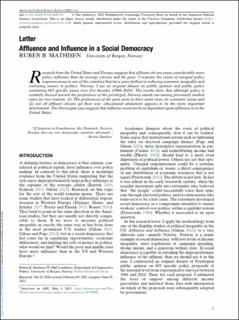Affluence and Influence in a Social Democracy
Journal article, Peer reviewed
Published version

Åpne
Permanent lenke
https://hdl.handle.net/11250/3063723Utgivelsesdato
2023Metadata
Vis full innførselSamlinger
Originalversjon
American Political Science Review. 2023, 117 (2), 751 - 758. 10.1017/S0003055422000739Sammendrag
Research from the United States and Europe suggests that affluent citizens enjoy considerably more policy influence than do average citizens and the poor. I examine the extent of unequal policy responsiveness in one of the countries that have gone farthest in reducing economic inequality and restricting money in politics: Norway. I use an original dataset on public opinion and public policy containing 603 specific issues over five decades (1966–2014). The results show that although policy is certainly skewed toward the preferences of the privileged, Norway stands out among previously studied cases for two reasons: (1) The preferences of the poor seem to have some sway on economic issues and (2) not all affluent citizens get their way: educational attainment appears to be the more important determinant. The Norwegian case suggests that influence need not be as dependent upon affluence as in the United States.
